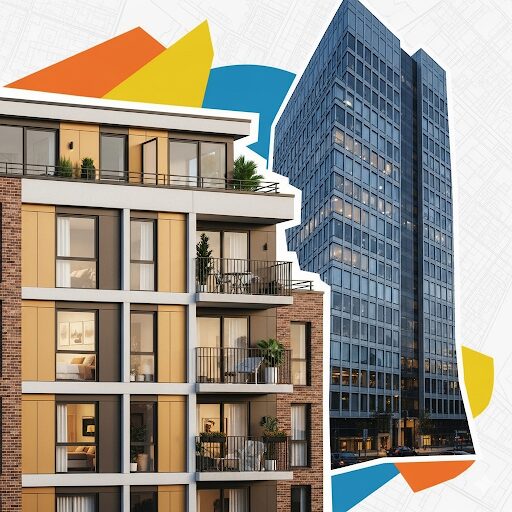
The Ultimate Guide to Apartment and Office Building Insurance: Protecting Your Commercial Real Estate Investment
Navigating the complexities of commercial property insurance is a critical step for any apartment building owner or office building investor. A comprehensive building insurance policy is not just a safety net; it’s a fundamental component of a successful real estate investment strategy, offering robust protection against a myriad of financial risks. This guide will delve into the essential coverages for both apartment building insurance and office building insurance, what to include in your policy for maximum protection, and the significant benefits of being adequately insured. Understanding these key elements will ensure your valuable assets are safeguarded, providing you with peace of mind and securing the longevity of your investment. If you are looking for just a Homeowner Insurance Policy, you can find it in the Personal Insurance section.
Core Coverages: The Foundation of Your Protection
Both apartment building insurance and office building insurance are built upon a foundation of core coverages that address the most common and significant risks. While the specific needs may vary, these fundamental protections are universally essential for any commercial real estate owner.
A Business Owner’s Policy (BOP) is often a cost-effective and convenient starting point, bundling several key coverages into a single policy. The primary components include:
-
- Commercial Property Insurance: This is the cornerstone of your policy, protecting the physical structure of your building and its permanent fixtures from a wide range of perils. This includes damage from fire, windstorms, hail, vandalism, and certain types of water damage (excluding flooding from external sources). It also typically covers other structures on the property, such as garages, fences, and swimming pools. For apartment buildings, this extends to common areas like lobbies, hallways, and fitness centers. For office buildings, it covers the main structure, including lobbies, elevators, and shared tenant spaces.
-
- General Liability Insurance: This is your shield against claims of bodily injury or property damage that occur on your premises. For an apartment building owner, this could be a tenant slipping on an icy sidewalk or a visitor tripping on a loose carpet in a common area. For an office building owner, this might involve a client’s employee falling in the lobby or damage to a visitor’s property caused by a building malfunction. General liability insurance covers legal defense costs, settlements, and judgments, protecting your business from potentially devastating lawsuits.
-
- Business Income Insurance (or Business Interruption Insurance): If a covered peril, such as a fire, renders your building uninhabitable, this coverage is crucial. It helps replace lost rental income from tenants in an apartment building or lease payments from businesses in an office building while the property is being repaired or rebuilt. This ensures a continued cash flow, allowing you to meet your financial obligations, such as mortgage payments and property taxes, even when your building is not generating revenue. You can also consider Business Owner Insurance.
What to Include: Tailoring Your Policy for Comprehensive Security
Beyond the core coverages, several optional but highly recommended endorsements and additional policies can significantly enhance your protection. Including these in your commercial building insurance portfolio is a proactive measure to mitigate a wider range of potential financial losses.
-
- Ordinance or Law Coverage: This is a critical addition, especially for older buildings. If your property is damaged and needs to be rebuilt, current building codes may require more expensive materials or construction methods than were originally used. Standard property insurance only covers the cost to rebuild to the previous standard. Ordinance or law coverage helps pay for the increased cost of complying with new building codes.
-
- Equipment Breakdown Insurance: Modern buildings rely on a host of complex machinery. This coverage protects against the sudden and accidental breakdown of essential equipment, such as HVAC systems, boilers, elevators, and electrical panels. The cost to repair or replace this equipment can be substantial, and this insurance helps to cover those expenses.
-
- Commercial Umbrella Insurance: This policy provides an extra layer of liability protection that sits on top of your general liability and other liability policies. If a major lawsuit results in a judgment that exceeds the limits of your primary liability coverage, your umbrella insurance will kick in, preventing a catastrophic financial loss.
-
- Flood and Earthquake Insurance: Standard commercial property policies typically exclude damage from floods and earthquakes. If your property is located in an area prone to these natural disasters, purchasing separate flood insurance (often through the National Flood Insurance Program) and earthquake insurance is a prudent investment.
-
- Workers’ Compensation Insurance: If you employ staff, such as maintenance personnel, property managers, or janitorial staff, workers’ compensation insurance is generally required by law. This covers medical expenses and lost wages for employees who are injured or become ill on the job.
The Unmistakable Benefits: Why Building Insurance is Non-Negotiable
The advantages of having the right apartment building insurance or office building insurance extend far beyond simply fulfilling a lender’s requirement. The benefits are integral to the financial health and stability of your real estate investment.
-
- Financial Security and Asset Protection: The most significant benefit is the protection of your substantial financial investment. In the face of a major disaster, insurance provides the funds to rebuild and recover, preventing a total loss of your asset.
-
- Liability Shield: Lawsuits can arise unexpectedly and can be financially crippling. Comprehensive liability coverage safeguards your business from the high costs of legal defense and potential settlements, protecting your personal and business assets.
-
- Consistent Cash Flow: Business income insurance ensures that a covered loss does not halt your revenue stream. This financial stability is crucial for maintaining your investment’s profitability and meeting ongoing expenses.
-
- Peace of Mind: Knowing that your property, your tenants or lessees, and your financial future are protected allows you to focus on managing and growing your real estate portfolio with confidence. It transforms a source of potential worry into a secure and reliable investment.
In conclusion, investing in robust apartment building insurance or office building insurance is a non-negotiable aspect of responsible commercial real estate ownership. By securing a comprehensive policy that includes both foundational and specialized coverages, you are not just buying an insurance product; you are investing in the long-term viability and success of your property.
#CommercialRealEstate #BuildingInsurance #ApartmentInsurance #OfficeBuildingInsurance #PropertyInsurance #LandlordInsurance #RealEstateInvesting #AssetProtection #CommercialProperty #RiskManagement #BusinessInsurance #PropertyManagement #InsuranceTips #InvestmentProperty #LandlordLife #CRE
